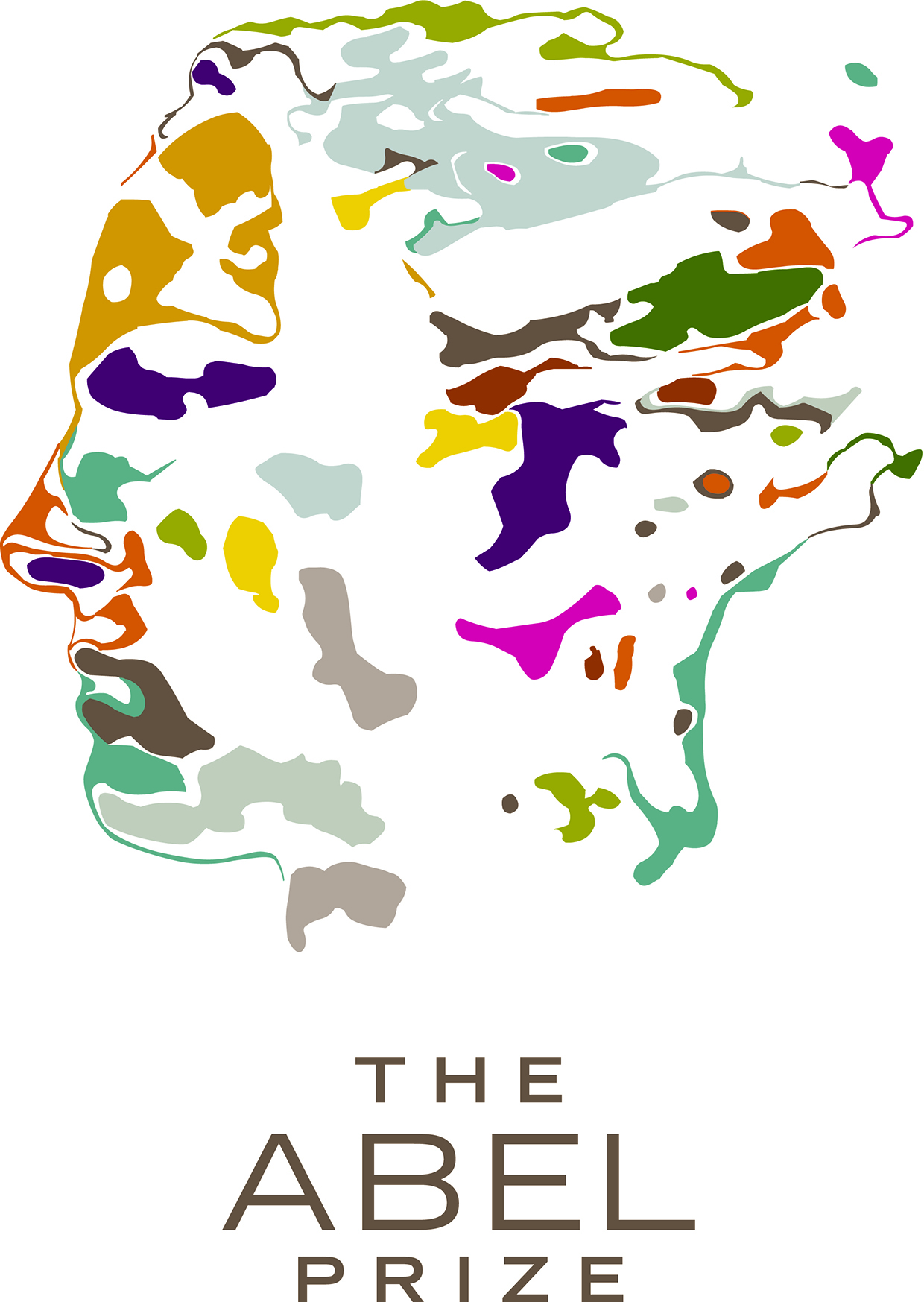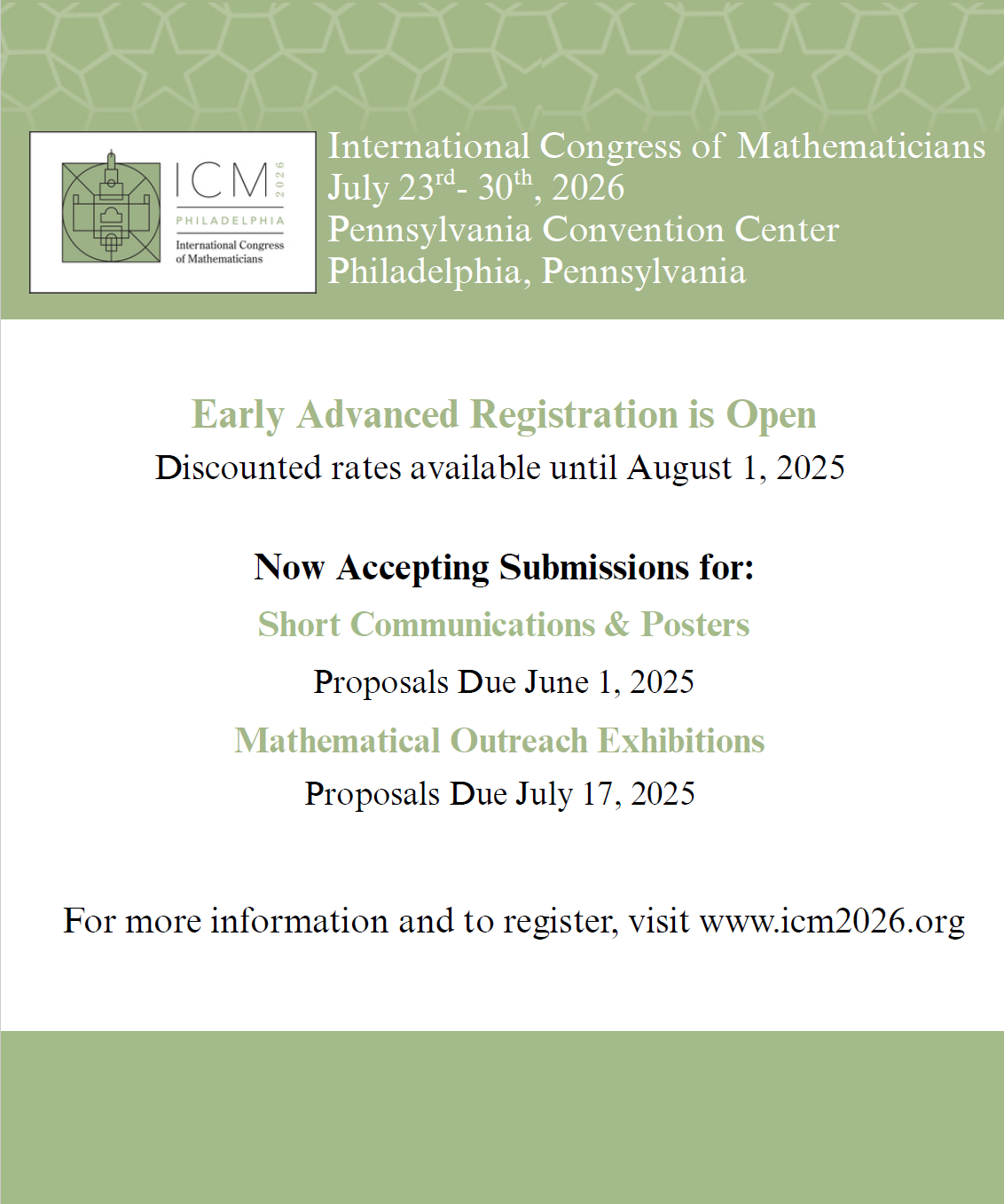IMU News 132: July 2025
A Bimonthly Email Newsletter from the International Mathematical Union (pdf)
Editor: Yoshiharu Kohayakawa, Universidade de São Paulo, Brazil
Editorial
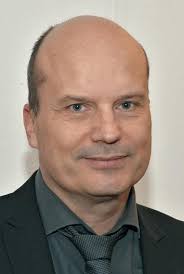 The next General Assembly (GA) of the International Mathematical Union will be held in New York City, USA, on 20–21 July 2026, just before the next International Congress of Mathematicians (ICM), which will take place from 23 to 30 July 2026 in Philadelphia, USA.
The next General Assembly (GA) of the International Mathematical Union will be held in New York City, USA, on 20–21 July 2026, just before the next International Congress of Mathematicians (ICM), which will take place from 23 to 30 July 2026 in Philadelphia, USA.
This will be the 20th meeting of the GA. The first GA was held in Rome, Italy, in 1952, just after the foundation period (1945–1951) of the new IMU. At that time, the IMU had 22 member countries; now the IMU has 84 member countries. In Rome, it was agreed that the second GA would be held two years later, at the time and place of the 1954 ICM in Amsterdam, Netherlands. Subsequently, GAs have been held every four years, typically preceding the ICM in a location close to the ICM’s venue.
The IMU’s day-to-day decisions are made by the IMU Executive Committee (EC), but the IMU’s key decisions are taken by the GA. Quoting from the Guidelines adopted by the 17th GA:
The General Assembly is the main body of the International Mathematical Union. It admits IMU members, elects the IMU Officers and the members of the IMU Executive Committee, establishes commissions, determines the budget, and decides about the IMU Statutes, the rules of conduct, and many other issues. The General Assembly consists of Delegates appointed by the Adhering Organizations, together with the members of the Executive Committee, and of the Representatives of Associate and Affiliate Members. Guests and Observers may be invited additionally. Only Delegates have voting rights. The IMU Statutes contain a detailed description of the rights and duties of the GA.
Following Article 20 of our Statutes, the number of possible Delegates of every IMU member country corresponds to their Group of Adherence: for example, a country which is in Group 1 may appoint one Delegate, while a country in Group 3 may appoint three Delegates, etc. At the first GA in Rome, 37 out of a possible 49 Delegates were present. In New York City next year, the total possible number of Delegates will be 183.
Like the 2022 GA meeting in Helsinki, Finland, the New York City meeting will be hybrid, facilitating both in-person and remote participation. Like in Helsinki, voting during the next GA will be conducted electronically, allowing for remote voting.
A typical GA is scheduled over two meeting days, with arrivals, check-in, and on-site registration on the day before, and departure on the day after the meeting days.
The next GA in 2026 will follow this schedule as well as the usual agenda. After the opening by the IMU President, several subcommittees will be appointed: the Credentials Committee (responsible for verifying that each delegation is correctly constituted according to the list of registered Delegates), the Finance and Dues Committee (responsible for reviewing the proposed 2027–2030 budget and making recommendations to the GA concerning dues), the Election Committee (responsible for handling the election process and deciding on all issues related to it), as well as the Resolutions Committee (responsible for reviewing resolutions received from delegations prior to the GA and those put forward during the GA meeting).
Following this initial setup, the GA will start its work. Highlights will be the review of the activities of the Union by the IMU EC, the reports from the scientific organization of ICM 2026 by the Structure and Program Committees, the reports from the IMU Commissions and Committees and of IMU’s Affiliate Members, as well as deciding on the 2027–2030 budget and dues, the election of the 2027–2030 IMU EC, CDC, and ICHM Officers, and the selection of the venues of the GA and ICM 2030.
The GA offers a unique opportunity for meaningful engagement and collective decision-making, attracting Delegates from countries all over the world to represent their respective Adhering Organization. The 2026 GA local committee, in collaboration with the Simons Foundation, the IMU, and its Secretariat, is working hard to ensure a smooth, productive, and enjoyable GA for all participants.
ICM 2026 Speakers
The speakers of ICM 2026 have been announced: visit this page from the ICM 2026 website. The scientific programme of ICM 2026 will be composed of 20 sections, as identified by the ICM Structure Committee. For the full report from the ICM Structure Committee, visit this page.
Registration. Let us remind the reader that the ICM 2026 registration system is open, and to benefit from reduced rates participants should complete the registration process by the following deadlines:
- Early Advanced: Register by 1 August 2025
- Advanced: Register by 11 May 2026
Visit this page and check the registration instructions.
Jacob Palis (1940–2025)
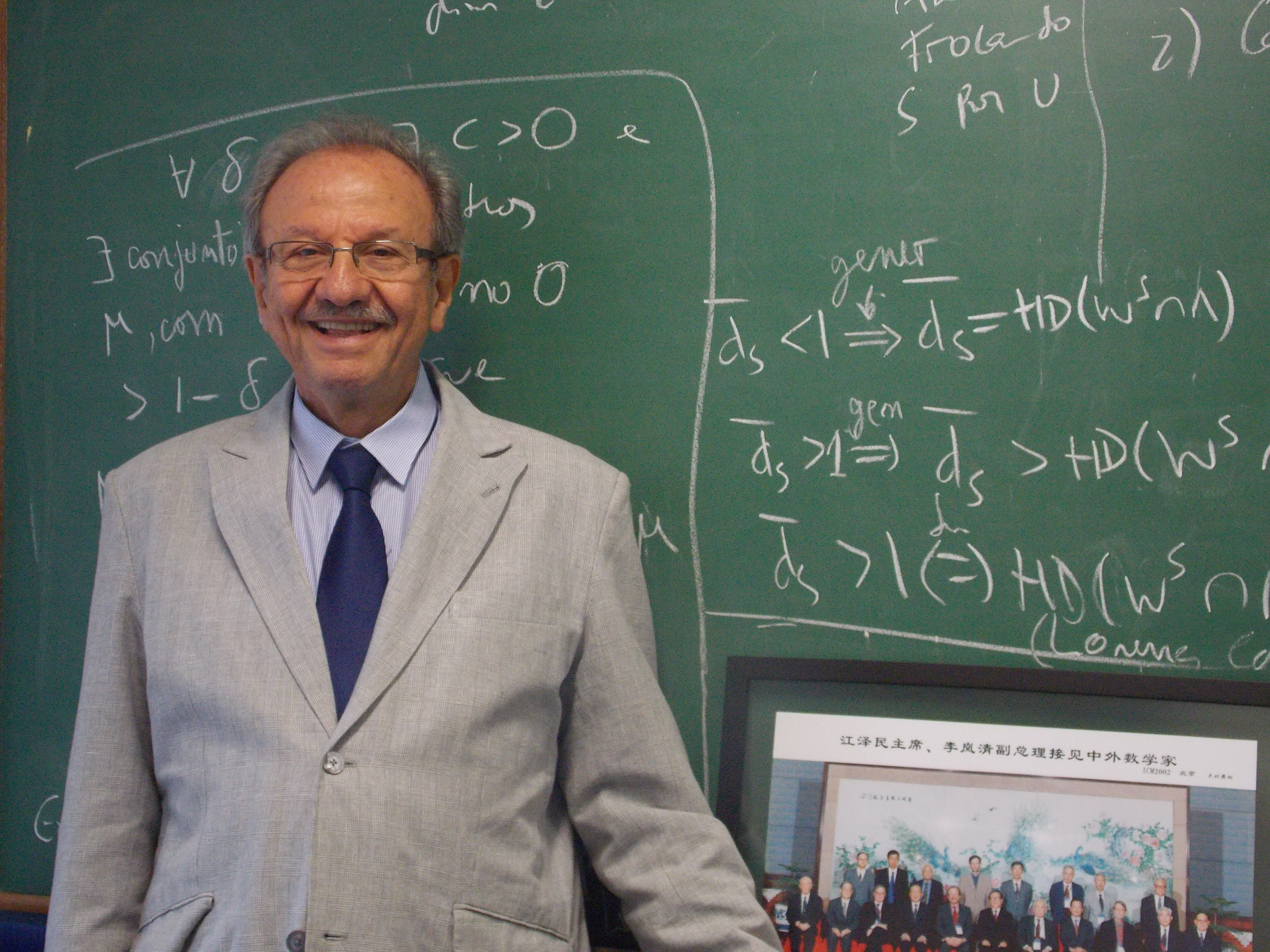
Jacob Palis passed away on May 7, 2025, at the age of 85, in Rio de Janeiro, Brazil. He was born in Uberaba, a small town in the state of Minas Gerais, Brazil, which had approximately 40,000 inhabitants at that time. He was the youngest of eight siblings in a family of Syrian-Lebanese immigrants who strongly emphasized the importance of education for their children.
Like many Brazilian mathematicians of his generation, Palis began his academic journey in engineering. While studying at the Federal University of Rio de Janeiro (UFRJ), he also attended several courses at the Institute of Pure and Applied Mathematics (IMPA). He later moved to the University of California at Berkeley to pursue graduate studies, completing his PhD in 1967 under the supervision of Stephen Smale. This was an exceptionally vibrant period at Berkeley: in 1966, Smale was awarded the Fields Medal, and at that time the hyperbolic theory was emerging. Initiated by Smale and his collaborators, including Palis, this theory offered a framework for analyzing and characterizing a broad class of dynamical systems, including some with chaotic behavior. A central concept was that of structural stability: the idea that certain dynamical properties remain intact under small perturbations of the system. Curiously, a great part of the research of Palis was devoted to studying how systems lose their stability. He made substantial contributions to the theory of homoclinic bifurcation and to the understanding of dynamics beyond uniform hyperbolicity.
In 1968, Jacob Palis returned to Brazil. After a brief period at the Federal University of Rio de Janeiro (UFRJ), he joined IMPA, where he remained a professor until the end of his career. He served as the director of IMPA for many years, playing a central role in its growth and development. Shortly after his return, in 1971, Palis co-organized an international conference on dynamical systems in Salvador, Bahia, alongside Elon Lima and Maurício Peixoto. This event was the first of its kind in Brazil and a landmark in the area. It brought together many leading figures in the field of dynamical systems. It had a profound impact on the development of the area in Brazil. It also marked a significant milestone in the internationalization of Brazilian mathematics.
Jacob Palis was a passionate advocate for mathematics, playing a central role in strengthening the global mathematical community. Throughout his career, he was a driving force behind the growth of mathematics in Brazil, across Latin America, and in developing countries. A defining characteristic of Palis was his commitment to promoting scientific collaboration. Throughout his career, he organized numerous international conferences, many of which were held at IMPA. Additionally, he was deeply involved in organizing a series of international schools and conferences at the International Centre for Theoretical Physics (ICTP) starting in the 1980s. These schools had a great impact and played a crucial role in disseminating the theory of dynamical systems worldwide.
From 1991 to 1998 Jacob Palis served as the Secretary General of the International Mathematical Union (IMU) and later, from 1999 to 2002, as its President. He vigorously promoted international collaboration and capacity-building efforts. His leadership extended well beyond the IMU: he headed the Brazilian Mathematical Society, the Brazilian Academy of Sciences, and The World Academy of Sciences (TWAS). During his tenure leading these academies and institutions, he consistently left a profound personal mark. He promoted numerous initiatives to expand their presence and visibility in society and was deeply committed to fostering the development of young scientists.
Jacob Palis was a member of numerous academies of sciences worldwide and received many prestigious awards, including the TWAS Prize for Mathematics, the Balzan Prize, and the Abdus Salam Medal. He was also honored with national recognitions from both Brazil and France.
He played an active role in scientific journals, notably serving as Chief Editor of the Bulletin of the Brazilian Mathematical Society. In this role, he worked to elevate its scientific standards and enhance its international presence, laying a strong foundation for its future.
Jacob Palis had an extensive range of scientific publications, including numerous articles in prestigious journals. He made significant contributions to the field of homoclinic bifurcations. Additionally, he authored two highly influential books: “Geometric Theory of Dynamical Systems: An Introduction,” co-authored with Wellington de Melo, and “Hyperbolicity and Sensitive Chaotic Dynamics at Homoclinic Bifurcations: Fractal Dimensions and Infinitely Many Attractors,” co-authored with Floris Takens.
In the early 2000s, following the significant impact of Mañé's work on the stability conjecture, Newhouse's findings on the coexistence of infinitely many attractors at homoclinic bifurcations, and the discovery of strange attractors in Hénon families by Benedicks and Carlesson, Jacob Palis began to formulate several conjectures aimed at achieving a global understanding of dynamics. One of these conjectures characterizes the boundary of hyperbolicity as being formed by systems exhibiting homoclinic or heteroclinic cycles. Another conjecture explored the long-term behavior of dynamical systems and the role of attractors, suggesting that typically there are finitely many attractors that exhibit favorable statistical properties. These conjectures have been extremely influential and remain open, although there have been many partial advances in these areas.
Those who had the privilege of working or collaborating with Jacob Palis were deeply touched by his warm personality, infectious enthusiasm, boundless energy, and extraordinary generosity. He showed special care and attention to young mathematicians, regardless of their background, offering constant support, encouragement, and inspiration. This is evident in his legacy of mentoring more than 40 PhD students and having over 350 academic descendants.
His presence left a lasting impact, both human and intellectual. The mathematical community as a whole, including those in supporting and organizational roles, will feel his absence profoundly.
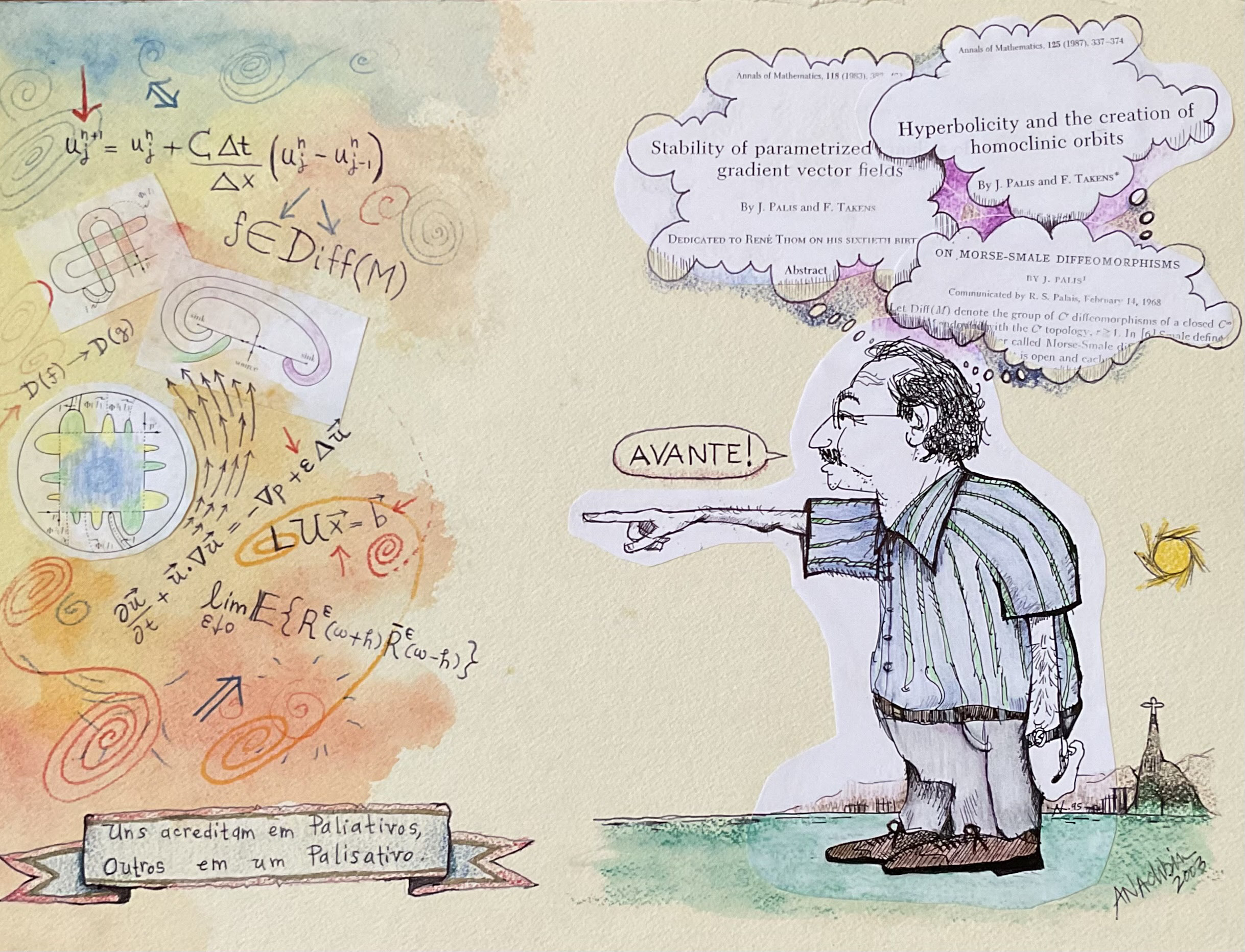
Lorenzo J. Díaz
PUC-Rio – Pontifícia Universidade Católica do Rio de Janeiro
The 2025 Abel Week
The 2025 Abel Week took place from 19 to 22 May 2025. Videos of the Abel Prize Award Ceremony and of the Abel Lectures are now available on the Abel Prize YouTube channel.
Kyoto Prize 2025
The 2025 Kyoto Prize in the Advanced Technology category has been awarded to Shun-ichi Amari, from Teikyo University and RIKEN, for his “pioneering contributions to opening up theoretical foundations of artificial intelligence and establishment of information geometry.” Amari’s achievement digest reads as follows: “Shun-ichi Amari has conducted pioneering research in artificial neural networks and established the field of information geometry, which studies statistical models using the techniques of differential geometry, thereby proposing many important theories. His contributions to both theory and application, influencing various fields, are of major significance.”
Amari was born in 1936 and obtained his doctorate in mathematical engineering at The University of Tokyo in 1963. After four years at Kyushu University, he went back as an Associate Professor to The University of Tokyo, where in 1996 he became Professor Emeritus. He has also been with RIKEN since 1994, where he is now an Honorary Science Advisor. Since 2021, he is a Specially Appointed Professor at Teikyo University. Amari is a member of the Polish Academy of Sciences and of the Japan Academy. He was conferred the Order of Culture of Japan in 2019.
A Statement of the International Science Council
The Governing Board of the International Science Council, of which the IMU is a member, issued a statement titled “International scientific collaboration: Vital yet vulnerable” on 20 June 2025. The statement underscores the urgent need to protect and strengthen global cooperation in science. The full statement is available online.
Please take some time to read this statement and distribute it further within your community.
Participation in Scientific Organizations: A Survey by the ISC, IAP and SCGES


The IMU is a member of the International Science Council (ISC) and a founding partner of the Standing Committee for Gender Equality in Science (SCGES).
The ISC, the InterAcademy Partnership (IAP) and the SCGES have now created a survey to explore how scientists participate in scientific organizations over the course of their careers. The outcome of the survey is expected to help broaden understanding of how scientific organizations function and evolve globally. Specific information can be found on the survey’s landing page.
Readers are encouraged to complete the survey and to distribute it further within their community. This survey will close on 5 August 2025.
News from the International Commission on Mathematical Instruction (ICMI)
Please find below the calls for nominations for the 2028 ICMI Emma Castelnuovo Award and the 2028 Felix Klein and Hans Freudenthal Awards.
Deadline for all nominations: November 30, 2026
Call for Nominations for the 2028 ICMI Emma Castelnuovo Award, by Professor Emerita Kaye Stacey, Chair of the Award Committee.
The Emma Castelnuovo Award recognizes outstanding achievements in the practice of mathematics education consistent with ICMI’s principles:
- the development of mathematical education at all levels and
- the promotion of reflection, collaboration, exchange, and dissemination of ideas on the teaching and learning of mathematics from the primary to the university level.
The award was named after Emma Castelnuovo (1913–2014), an Italian mathematics educator, in celebration of her 100th birthday and to honor her pioneering work. The first Emma Castelnuovo medal was awarded to Hugh Burkhardt and Malcolm Swan in 2016 at the 13th International Congress on Mathematical Education (ICME-13) in Hamburg, Germany.
Eligibility for the Emma Castelnuovo Award. The award is open to nominees from all in the mathematics education community, with the exception of
- current ICMI Executive Committee members,
- current members of the Emma Castelnuovo Award Committee,
- previous winners of the award.
The Emma Castelnuovo Award honors an individual, or a small team of individuals, for work in the development and implementation of exceptionally excellent and influential work in the practice of mathematics education related to one or more of the following:
- classroom teaching,
- curriculum development,
- instructional design (of materials or pedagogical models),
- teacher education programs, and/or
- field projects with a demonstrated influence on schools, districts, regions, or countries.
The Emma Castelnuovo Award seeks to recognize and encourage efforts, ideas and their successful implementation of mathematics teaching and learning, as well as to showcase models and exemplars of inspirational practices.
Criteria for Evaluating Nominees. Nominees for the Emma Castelnuovo Award will be evaluated in light of the following criteria:
- the educational rationale for the nominee’s work, and what served as a catalyst for that work,
- the mathematics teaching/learning problem/s addressed by the nominee,
- the nominee’s role in addressing the problem/s and opportunities, whether they involve curriculum development, pre-service teacher education, in-service professional development/learning, instructional design, field projects, or other areas of mathematics education practice,
- the conditions under which the work has taken place, that is, the cultural and political context, infrastructure, funding support, and people involved,
- the originality and creativity of the work, the approaches taken to address the identified mathematics teaching/learning problem/s, the design and development process, and the products/outcomes of the work,
- the extent and quality of networking with key stakeholders (e.g., in bridging theory and practice),
- evaluations of the work,
- the extent of the influence/impact of the work on educational practice in the teaching/learning of mathematics, including quantitative or qualitative evidence of that influence,
- the potential of the work to serve as a model, either for inspiring others addressing similar problems, or because an approach was taken that could be applied elsewhere with appropriate modifications.
Nomination process and supporting documentation required. Nominations for the Emma Castelnuovo Award should be made by the nominator on the Nomination Form and must include the following attachments:
- A one-page summary statement outlining the reasons for the nomination.
- A document (max. 5 pages) describing the nominee’s work in relation to the above criteria.
- An account (max. 10 pages) including the genesis of the nominee’s work and the roles played by the nominee as well as other significant people (if any). This account should also contain a description of the impact (locally, nationally, internationally) of the work on the practice of mathematics teaching and learning, where and by what means the work has been disseminated, the extent of the adoption/implementation of the work, and/or further developments arising from the work.
- Brief curricula vitae (max. 2 pages per person) of the nominee(s).
- Electronic copies of three publications that reflect the nominee’s work related to the practice of mathematics education (e.g., journal articles, textbooks, instructional materials, CD-ROMs, etc). N.B. If a publication is not in English, include an extended abstract (max. 2 pages) in English.
- Three to five letters of support from different stakeholders/scholars, preferably from different countries.
- The names and e-mail addresses of the nominator/s who can provide further information, if needed.
All nominations must be sent to the Chair of the Emma Castelnuovo Award Committee, Professor Kaye Stacey, by email, no later than November 30, 2026. The Chair will typically confirm receipt within a week of receiving the nomination. If more time than that elapses, please write the Chair directly, to make sure the nomination was not misdirected to a spam folder.
Announcement of the Awardee of the 2028 Emma Castelnuovo Award. The recipient of the award will remain secret until the Awards Ceremony at the opening of ICME-16 in July 2028 in Prague, Czech Republic. The awardee (or representative) will be invited to present a special lecture at ICME-16.
The 2028 Emma Castelnuovo Award Committee. Professor Emerita Kaye Stacey was nominated by the President of ICMI as Chair of the 2028 Emma Castelnuovo Award Committee. There are five other members in the Committee. They remain anonymous until their terms on the committee come to an end. The six committee members come from six different countries and represent different world regions. The work of the Emma Castelnuovo Award Committee is confidential.
The committee now welcomes nominations for the award.
Information about all ICMI awards can be found here, and for the previous award recipients, visit this page.
Call for Nominations for the 2028 Felix Klein and Hans Freudenthal Awards, by Professor Alan Schoenfeld, Chair of the Award Committee. Starting in 2003, the International Commission on Mathematical Instruction (ICMI) has given two awards to recognize outstanding accomplishments in mathematics education research:
- the Felix Klein Award, for lifelong achievement in mathematics education research,
- the Hans Freudenthal Award, for a major program of research on mathematics education.
The call for the 2028 awards is given below. Please consider nominating a worthy candidate. This is our mechanism for highlighting the contributions of major scholars who have moved the field forward through focused research programs and lifetime contributions. We recognize that it is a lot of work to put together a compelling nomination, but please do! ICMI Awards Committees can only choose recipients from officially submitted nominations for the current round, accompanied by full documentation, as specified in the calls.
The committee welcomes nominations for the two awards from individuals or groups of individuals in the mathematics education community. The awards committee is committed to the equitable consideration of all researchers in mathematics education, including candidates of diverse national origin, race, ethnicity, sexual orientation, and members of marginalized or under-represented communities. We encourage the nomination of a broad range of highly qualified candidates and will give all applications received full and careful consideration.
Thank you for considering this call seriously. We look forward to receiving your nominations.
Felix Klein Award. The Felix Klein medal is awarded for life-time achievement in mathematics education research. This award acknowledges senior scholars who have made field-defining contributions over their professional careers. Awardees will have had an impact both at the national level, within their own countries, and at the international level. We have valued in the past those candidates who not only have made substantial research contributions, but also have introduced new issues, ideas, perspectives, and critical reflections. Additional considerations have included leadership roles, mentoring, and peer recognition, as well as the actual or potential relationship between the research done and improvement of mathematics education at large, through connections between research and practice.
Nominations for the Felix Klein Award should include the following:
- A document (max. 8 pages) describing the achievements of the nominee (e.g., their theoretical contribution and/or empirical research, leadership roles, graduate supervision and mentoring, and peer recognition) and reasons for the nomination (including a description of the nominee’s impact on the field).
- A one-page summarizing statement.
- A curriculum vitae of the nominee (max. 20 pages).
- Electronic copies of three of the nominee’s key publications.
- Three letters of support (preferably from different countries).
- The names and e-mail addresses of two persons other than the nominee herself or himself who could provide further information, if needed.
All nominations for the Felix Klein Award 2028 must be sent to the Chair of the Committee, Alan Schoenfeld, by email, no later than November 30, 2026. Please use the Felix Klein Award Nomination Form. The Chair will typically confirm receipt within a week of receiving the nomination. If more time than that elapses, please write the Chair directly, to make sure the nomination was not misdirected to a spam folder.
Hans Freudenthal Award. The Hans Freudenthal medal acknowledges the outstanding contributions of an individual’s theoretically robust and coherent research program, which has had a clear impact on our research community. It honors a scholar who has initiated a new research program and has brought it to maturation over the past 10 years. Freudenthal awardees should also be researchers whose work is ongoing and who can be expected to continue contributing to the field. In brief, the criteria for this award are depth, novelty, sustainability, and impact of the research program.
Nominations for the Hans Freudenthal Award should include the following:
- A document (max. 5 pages) describing the nominee’s research program and reasons for the nomination (including a description of the nominee’s impact on the field).
- A one-page summarizing statement.
- A curriculum vitae of the nominee (max. 10 pages).
- Electronic copies of three of the nominee’s key publications.
- Three letters of support (from different countries, if possible).
- The names and e-mail addresses of two persons other than the nominee herself or himself who could provide further information, if needed.
All nominations for the Hans Freudenthal Award 2028 must be sent by e-mail to the Chair of the Committee, Alan Schoenfeld, by email, no later than November 30, 2026. Please use the Hans Freudenthal Nomination Form. The Chair will typically confirm receipt within a week of receiving the nomination. If more time than that elapses, please write the Chair directly, to make sure the nomination was not misdirected to a spam folder.
Announcement of the Awardees of the 2028 Klein and Freudenthal Awards. The recipients of the awards will remain secret until the Awards Ceremony at the opening of ICME-16 in July 2028 in Prague, Czech Republic. The awardees (or representatives) will be invited to present a special lecture at ICME-16.
The 2028 Klein and Freudenthal Award Committee. Professor Alan Schoenfeld was nominated by the President of ICMI as Chair of the 2028 Felix Klein and Hans Freudenthal Award Committee. There are five other members of the committee. They remain anonymous until their terms on the committee come to an end. The six committee members come from six different countries and represent different world regions. The work of the Klein and Freudenthal Award Committee is confidential.
The committee now welcomes nominations for the awards.
Information about all ICMI awards can be found here, and for the previous award recipients, visit this page.
News from the Commission for Developing Countries (CDC)
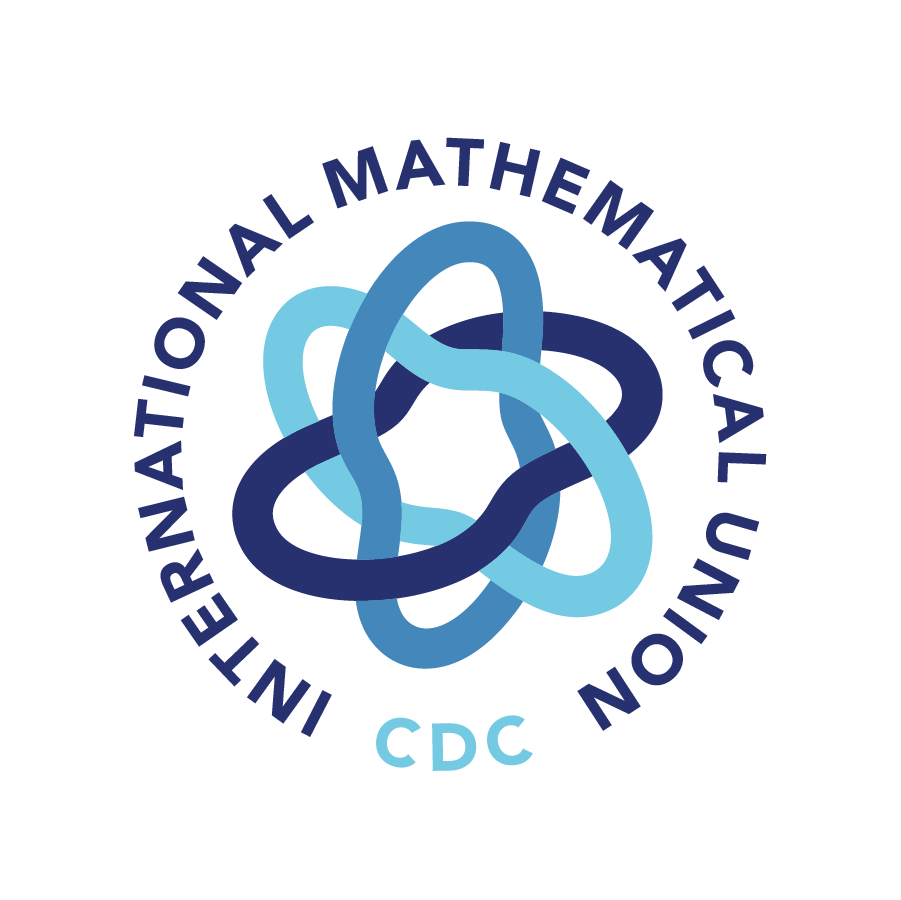 The next International Congress of Mathematicians will take place in Philadelphia, USA, from July 23 to 30, 2026. The call for applications for the ICM 2026 Travel Support Program, which provides financial support to mathematicians from eligible developing countries to attend, is now closed. We are pleased to report that the program received an impressive number of applications from across all continents. Notifications of the results have now been to the applicants. We warmly encourage everyone to register for the congress.
The next International Congress of Mathematicians will take place in Philadelphia, USA, from July 23 to 30, 2026. The call for applications for the ICM 2026 Travel Support Program, which provides financial support to mathematicians from eligible developing countries to attend, is now closed. We are pleased to report that the program received an impressive number of applications from across all continents. Notifications of the results have now been to the applicants. We warmly encourage everyone to register for the congress.
Below you will find information on the grant programs that are currently accepting applications. The CDC strongly encourages mathematicians and students from developing countries to apply to our calls listed below and to contact us in case of questions via email.
Grants for institutions
- Volunteer Lecturer Program (next deadline October15, 2025, for courses to be held between February 1, 2026, and February 1, 2027)
Grants for conferences organizers
- Conference Support Program (next deadline October 1, 2025, for conferences starting after February 1, 2026)
Grants for research visits
- IMU-Simons Research Fellowship Program for Developing Countries (next deadline October 1, 2025, for research visits starting between February 15, 2026, and February 15, 2027)
Grants for graduate students
- IMU Breakout Graduate Fellowship Program (the 2025 call is now closed)
- Graduate Research Assistantships in Developing Countries (GRAID) Program (the 2025 call is now closed)
News from the Committee for Women in Mathematics (CWM)
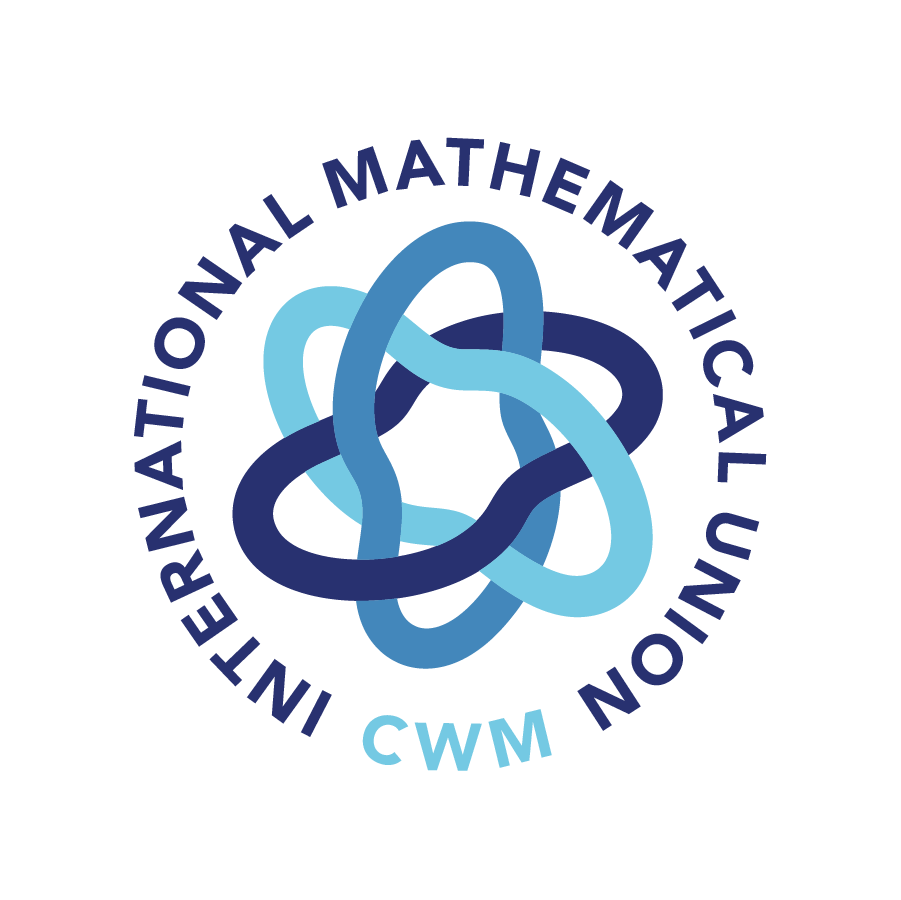
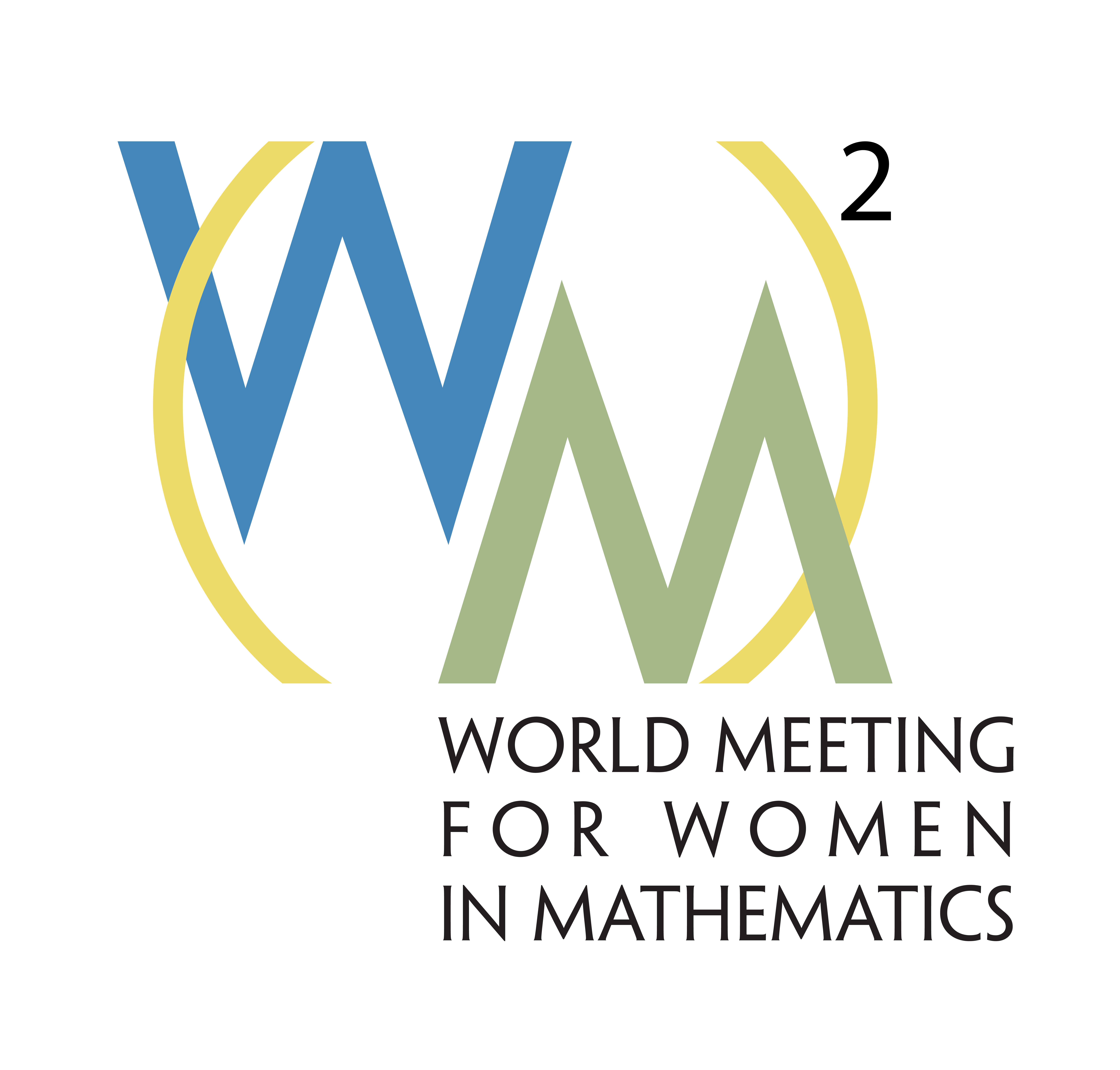 (WM)² Approved as a Satellite Event of ICM 2026. CWM is happy to announce that the III World Meeting for Women in Mathematics — (WM)² has been approved as a satellite event of ICM 2026!
(WM)² Approved as a Satellite Event of ICM 2026. CWM is happy to announce that the III World Meeting for Women in Mathematics — (WM)² has been approved as a satellite event of ICM 2026!
Date: July 22, 2026
Location: Pennsylvania Convention Center, Philadelphia, USA
(WM)² will take place the day before ICM 2026 and promises a vibrant day of mathematical excellence, community building, and dialogue. The program will feature invited research talks, a public lecture, a poster session, and meaningful discussions on advancing the participation and visibility of women in mathematics worldwide.
This third edition of (WM)² is organized by the CWM, with the support of the ICM 2026 Local Organizing Committee and the Association for Women in Mathematics (AWM). Building on the success of previous editions in Rio de Janeiro (2018) and online (2022), the 2026 event will offer an inclusive and welcoming space for mathematical exchange and reflection.
We are also pleased to share that the ICM 2026 Travel Support Program will cover travel dates that include July 22, ensuring that grantees from developing countries can arrive in time to fully participate in (WM)².
We warmly invite all members of the global mathematical community to join us in Philadelphia for this inspiring event. Stay tuned for updates and details visiting the (WM)² website, where the 2026 event page will soon be launched.
CWM Newsletter Issue 13 – July 2025. The 13th issue of the CWM Newsletter was released in July 2025. In addition to various news items and announcements, the newsletter features the article “The Mathematical Brilliance We Are Losing and What We Can Do About It” by C. Kenneth Fan, President and Founder of Girls’ Angle. The newsletter can be downloaded here.
You can subscribe to the CWM Newsletter on this page.
SCGES Releases Recommendations. The Standing Committee for Gender Equality in Science (SCGES) has published three sets of recommendations, now available on its website and as downloadable PDFs. These documents offer guidance for promoting gender equality in science, both within scientific communities and at various levels of influence. The recommendations include:
- SCGES Recommendations for Scientific Unions
- SCGES Recommendations for Instructors and Parents
- SCGES Recommendations for Science Local Institutions
All three recommendations are informed by the findings of the Gender Gap in Science (GGS) Project and aim to support systemic change and inclusive practices across the global scientific landscape.
Carolina Araujo and Hélène Barcelo
Chair and Vice-Chair of the IMU Committee for Women in Mathematics
News from the International Day of Mathematics (IDM)
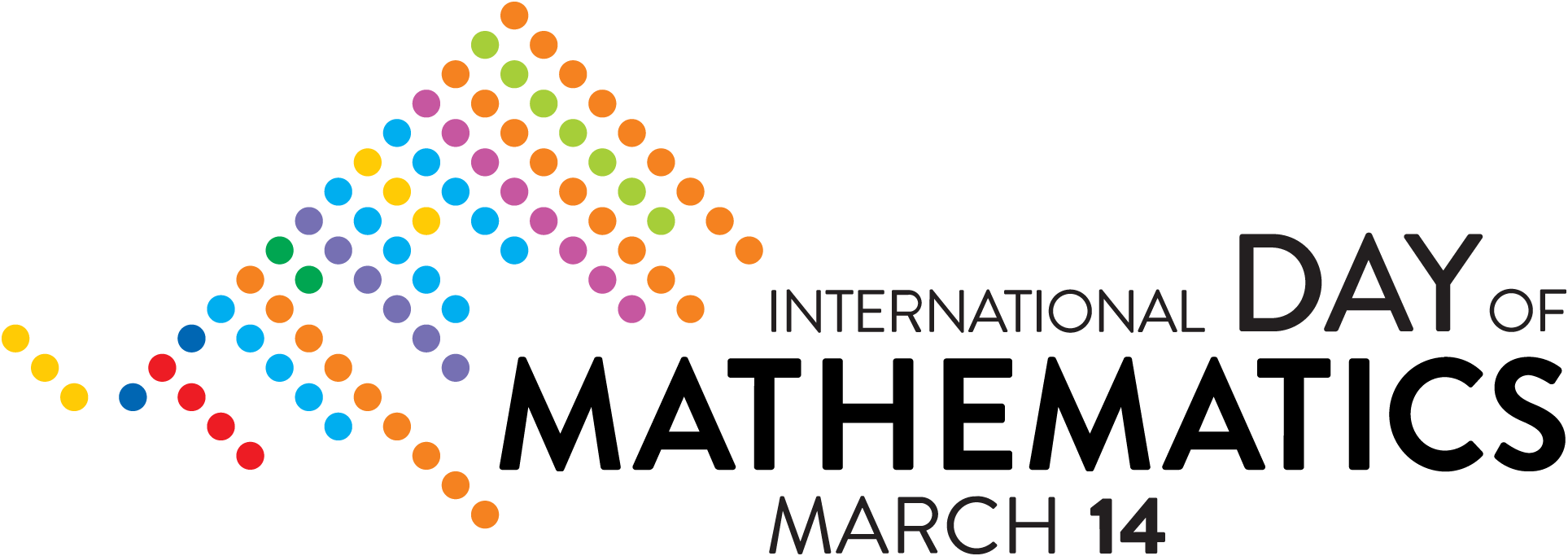 The IDM has now been celebrated for six years. There are events all over the world. Every year, organizations are invited to post their events on the IDM map.
The IDM has now been celebrated for six years. There are events all over the world. Every year, organizations are invited to post their events on the IDM map.
Every year a theme is chosen to flavor the celebration of the International Day of Mathematics (IDM) on March 14, to spark creativity and to bring light to connections between mathematics and all sorts of fields, concepts and ideas.
The IDM 2026 theme is
Thales said “Hope is the most universal of all human possessions, those who have nothing else still possess hope”. More than 2500 years later, we can say that mathematics is also another “most universal human possession”. More than ever, we need to connect our most universal possessions. Mathematics gives the hope that we can have a clear perception of reality and truth, share common definitions, learn cooperation, use data in a healthy way, find win-win strategies, and more...
The IDM founding chair Christiane Rousseau says: “Mathematics empowers us. It gives us tools to understand the challenges faced by societies and to contribute to a more human society and a society more resilient”. Bruny Mabien, member of the IDMGB comments after their first IDM organisation, “For once in our misfortune, mathematics brings a glimmer of hope to the lives of children in Haiti, a country where dreams often drown in doubt and uncertainty”. Ahmed Sidiki Diallo, coordinator of ASPnet in Burkina Faso (the network of UNESCO affiliated schools) is leading the IDM celebrations in Burkina Faso: “For more than nine years, thousands of children in Burkina Faso have been unable to learn to count or to grasp mathematical formulae. The IDM encourages a love of math and opens up new horizons for those still at school. When will the other children be given this opportunity?”
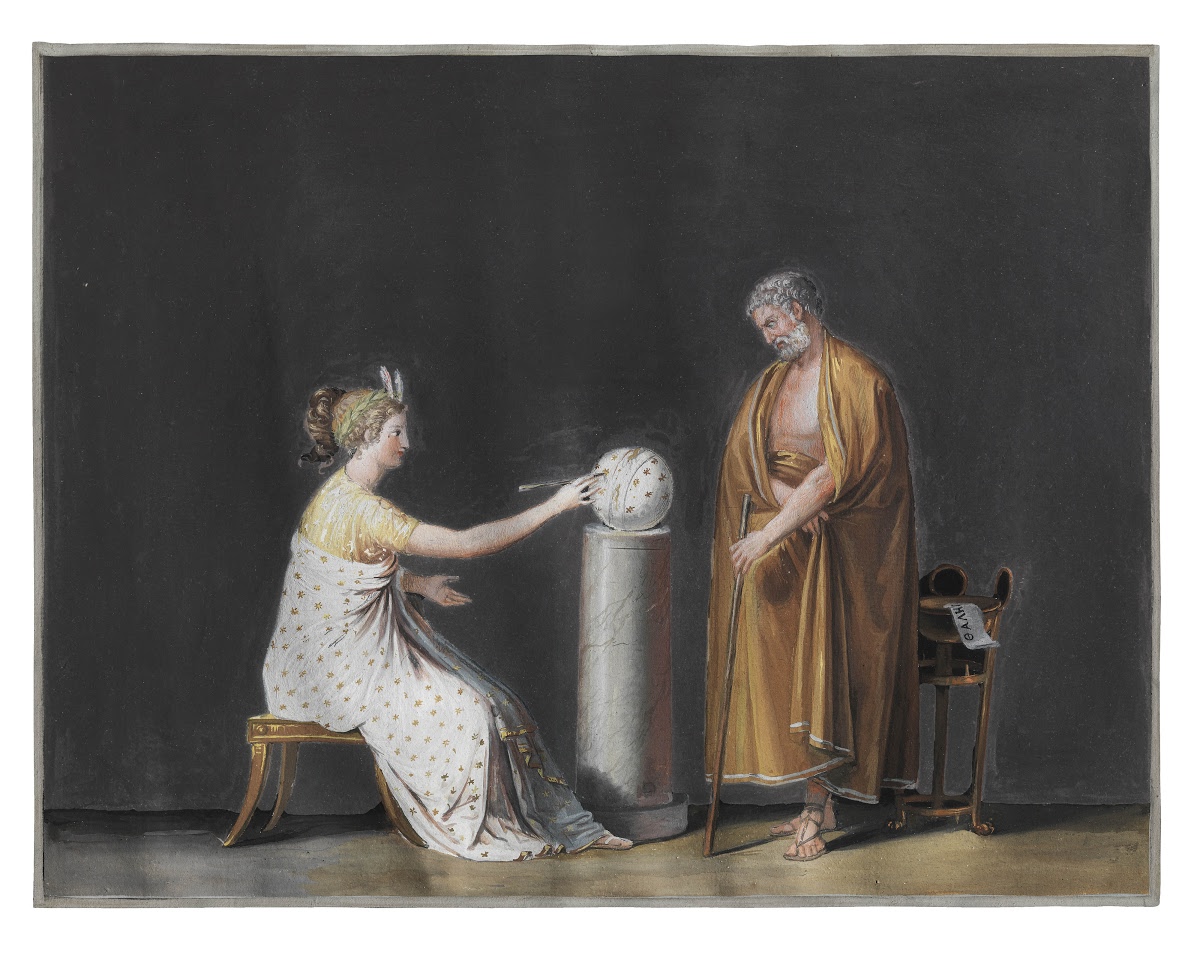
You are invited to subscribe to the IDM Newsletter in order to learn more about the resources and activities (including the annual challenge) around IDM 2026.
Betül Tanbay
Chair of the IDM Governing Board
Subscribing to IMU News
To subscribe to IMU News, please click here. When you subscribe, you will receive an e-mail message to confirm your subscription so that misuse will be minimized.
IMU will not use the list of IMU News emails for any purpose other than sending IMU News, and will not make it available to others.
Previous issues can be seen here.
